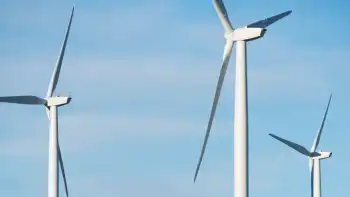Nuclear crisis a boost for renewables
- Governments around the globe questioned the use of nuclear power as Japan's attempts to avert a meltdown at one of its plants eroded confidence in nuclear energy and put more focus on the renewables industry.
Germany has suspended an agreement to extend the life of its nuclear power stations, while Switzerland put on hold some approvals for nuclear power plants.
Taiwan's state-run Taipower, in turn, said it was studying plans to cut nuclear power output.
The crisis at the quake-hit Fukushima nuclear power complex north of Tokyo is likely to increase opposition to major nuclear expansion in Europe and hurt a renaissance for the sector in the United States, which already has more than 100 reactors.
The disaster might give renewables and greener fuels such as LNG sector a boost in the quest for safer energy.
The crippled Japanese plant, near the epicenter of the March 11 8.9 magnitude quake, suffered a second explosion. Of Japan's 54 reactors, 11 are shut down because of the quake.
Senator Joe Lieberman, who chairs the U.S. Senate's homeland security panel, said the United States should "put the brakes on" new nuclear power plants until the impact of the incident in Japan became clear.
Shares in nuclear power related stocks tumbled on March 14 and utilities were the biggest losers in Europe, with the sector, including heavyweights E.ON and RWE, down 2 percent.
Shares in France's Areva, the world's largest nuclear plant builder, closed 10 percent lower.
Renewable stocks, however, posted massive gains, with the FTSE cleantech index up 1.4 percent.
"Political discussions are likely to focus on a rethinking of the use of nuclear power, which may involve discussions regarding a more central role of solar," Michael Tappeiner, analyst at UniCredit, said.
Asia's insatiable appetite for electricity is unlikely to derail nuclear programs but there might be a reassessment of design and safety and more diversification of energy sources.
Globally, renewable energy such as wind power could benefit in the medium term.
KGI Asia analyst Jennifer Liang said the nuclear incident had strengthened the case for safer sources of renewable energy. She also pointed to the current limitations of green energy.
"The solar or wind industry is still young and is unlikely to replace nuclear use in the near or medium term," she said from Taipei. "How do you replace the base load power from nuclear?"
Nuclear accounts for 30 percent of Japan's electricity.
"While Japan may stick to nuclear, it nuclear program will likely suffer delays and there will be more cost overruns," said Thiemo Lang, a Zurich-based senior portfolio manager with Sustainable Asset Management.
"Going forward, the scenario would be that Japan will reassess its nuclear program and will tap natural gas to assure energy supply and increase renewables," Lang added.
The risks associated with nuclear energy could further push new-build programs to the backburner in Britain and the United States, global political risk analysts the Eurasia Group said.
China, which has 13 reactors in operation and dozens under construction or planned, said its plants are safe but that the government would learn lessons from the Japanese crisis.
"Up to now we are paying attention to the impact of the earthquake on Japan's nuclear equipment and we are paying attention to how the situation develops," Zhang Lijun, vice-minister for environmental protection, had told reporters.
But the decision and schedule to develop nuclear power was unchanged, Zhang said.
China's nuclear firms say the country is capable of building as much as 100 GW of capacity by 2020, but there have been signs the government is going for a more cautious target of 70 GW.
The Nuclear Power Corporation of India Ltd. NPCIL, the country's monopoly nuclear power producer, said the events in Japan had prompted a safety review.
NPCIL operates 20 reactors with an installed capacity of 4,780 MW and the sector — estimated at about $150 billion over the next 15 years — is tightly controlled by the government.
India could now face calls to go slow on nuclear power and push renewable sources.
"What could now happen is the government will have to go slow with focus now more on greater scrutiny, robust safeguards, site selection. So we are looking at longer gestation periods," said Robinder Sachdev, head of think tank ImagIndia Institute.
South Korea plans to add 14 nuclear power reactors through to 2024, on top of an existing 21 to boost energy security and reduce carbon dioxide emissions.
The economy ministry said in a statement it would evaluate the shortcomings of Japan's nuclear power plants, and implement changes as necessary.
Shares in nuclear power plant designer KEPCO Engineering & Construction fell 14.7 percent and KR Plant Service & Engineering, which maintains and operates nuclear facilities, fell 14.5 percent.
Uranium miners Energy Resources of Australia, a unit of global miner Rio Tinto fell 12.2 percent and Paladin dropped 16.5 percent.
Shares in renewable energy companies rose in Hong Kong, with GCL Poly Energy, China's top polysilicon-maker, up 4.3 percent, while China Longyuan Power Group, the country's No. 1 wind power operator, up 1.7 percent.
Related News

BC Hydro to begin reporting COVID-19 updates at Site C
VANCOUVER - BC Hydro says it will begin giving regular updates to the public and the Peace River Regional District about its monitoring of the coronavirus COVID-19 at Site C.
BC Hydro met with the Peace River Regional District Sunday via phone call to discuss the forthcoming measures.
"We did a make a commitment to provide regular updates to Peace River Regional District member communities on an ongoing basis," said spokesman Dave Conway.
"(It's) certainly one of the things that we heard that they want and we heard that strongly and repeatedly."
Conway said updates could be posted as early as Monday on BC…




